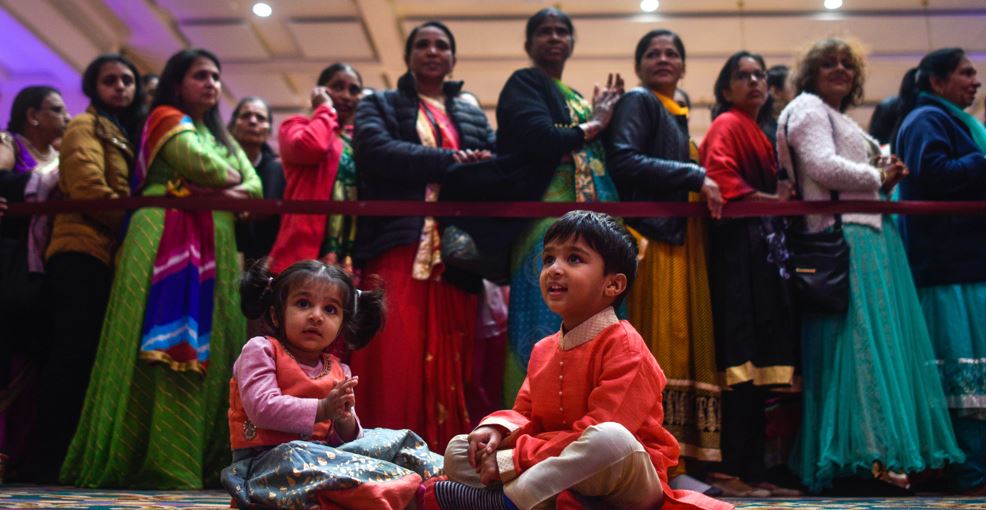- Saturday, July 27, 2024
Individuals of Indian origin scored the highest life satisfaction score of 7.79 compared to 7.67 in the Pakistani ethnicity and 7.72 for those from a white background

By: Nadeem Badshah
BRITISH Indians are among the happiest people in the country, who feel they have worthwhile lives, according to government research.
They scored 7.67 in their average happiness score which was the second highest after the Asian Other category – compared to 7.64 for those of Bangladeshi origin, 7.57 for people of Pakistani heritage and 7.54 from the white community.
Individuals of Indian origin scored the highest life satisfaction score of 7.79 compared to 7.67 in the Pakistani ethnicity, 7.53 among British Bangladeshis and 7.72 for those from a white background.
And when asked how worthwhile they felt their life was, British Indians achieved the second highest score after the Arab group, according to the Office for National Statistics data published in August.
Kiran Kaur Manku, from the University of Oxford and co-founder of The 1928 Institute, told Eastern Eye: “This data shows that the community is grateful and content with the environment they are in, and this could be related to their culture, religion and spirituality. This is demonstrated by the fact that the questions on happiness and life satisfaction show a stronger difference than average, compared to the questions on anxiety and if what they do in life is worthwhile.
“The subcontinent’s culture, with a belief or value system rooted in religion and spirituality, can be useful in promoting positive mental health. In fact, many of these elements are being used today in yoga, meditation, and mindfulness.
“Having spaces to regularly engage in a reflection of one’s relationship to the local environment, what you can change and what you can’t change, can impact your perspective of yourself and promote positive mental health.”
The data, based on survey results before the Covid pandemic, also showed that people of Indian, Pakistani and Bangladeshi heritage had lower than average levels of anxiety.
Dinesh Bhugra, professor of mental health and cultural diversity at King’s College London, said the interesting findings highlight there are clear cultural differences in rates of anxiety, depression as well as life satisfaction.
He told Eastern Eye: “These are possibly due to a number of factors such as educational, economic and social status, sense of belonging and purpose. These in turn rely on community cohesion, spirituality and other factors.
“More detailed work is needed to tease out differences. The study is a welcome first step in exploring cultural variations.
“It is entirely possible that attributions to karmic representations may provide a better explanation and sense of fulfilment. Equally, it is possible that these feelings of fulfilment are due to lower levels of anxiety.”
Manjula Sood MBE, the former mayor of Leicester, believes the find[1]ings are encouraging and a reflection of Asian communities being happier.
She said: “Asian communities have sense of belonging and shared values.
“Family structure is pivotal for the families which provides support, love, understanding and respect.
Extended families bring generations together and places of worship and cultural festivals build community networks.
“The tapestry of families has different strands of care, acceptance, perseverance and happiness.”
However, previous studies have shown that south Asian people are less likely to access mental health support for conditions such as depression due to stigma, a lack of awareness and some services not being culturally tailored.
Data in 2021 showed 3,307 per 100,000 people of Pakistani origin access NHS secondary mental health services compared to 4,030 per 100,000 for their white counterparts.
The figure was 3,407 per 100,000 for Bangladeshi people and lower for the Indian community with an uptake of 2,195 per 100,000 seeking help.
Manju Malhi received the British Empire Medal for her services to the community including teaching cookery skills to older people during the pandemic through healthy cookery courses via Zoom video calls.
Malhi, resident chef for the Open Age charity which helps adults older than 50 maintain an active life and learn new skills, has offered tips for better mental health.
She said: “If you can, introduce regular exercise in your life and make time for yourself as self esteem or the way you feel about yourself can affect your wellbeing.
“So identify the negative beliefs you have about yourself then challenge them,” Malhisaid.
“Sunny days, images of cute kittens and puppies, scenic views, laughter, receiving a compliment or even cleaning the house are other ways to reduce stress levels.
“Joining a social group or volunteering at a local charity can create community contentedness.
“Doing things you enjoy is important, such as going to a restaurant or a coffee with friends.”
Amjad Malik, a solicitor of Pakistani origin, said: “[The white community] are in some respects moving away from churches and social gatherings such as extended marriage events and cultural get togethers.
“Whereas the Asian community still holds religious gatherings as part of a societal element.
“We witness numbers at religious places of practice more and celebrating different cultural festivities which creates a support mechanism to share sorrow and happiness together impacting on overall satisfactory indicators of a community who is content and happier.”
Anyone feeling emotionally distressed or suicidal can call the Samaritans charity for help on 116 123 or email [email protected] in the UK